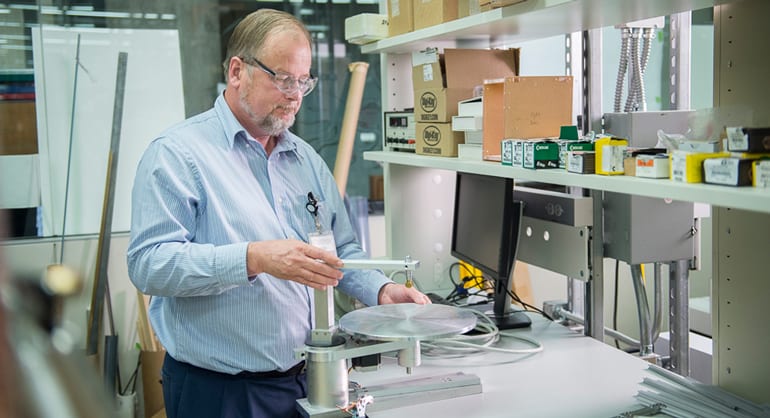A newly-launched advocacy group is aiming to increase the number and success rate of start-up ventures stemming from UW–Madison ideas, building on the renewed commitment in 2013 to campus innovation.
The Advocacy Consortium for Entrepreneurs (ACE) will strive to improve the UW–Madison environment for entrepreneurship and reduce barriers to starting companies. Leading the consortium is Rock Mackie, emeritus professor of medical physics, human oncology and engineering physics and director of the medical devices team at the Morgridge Institute for Research. He was a founder and the scientific force behind TomoTherapy, one of the university’s most successful modern spinoff companies.
ACE will complement the new Discovery to Product (D2P) initiative at UW–Madison, but also differ in key ways. ACE will be established as an independent, nonprofit organization that can lobby and advocate for campus, state and federal policies that support entrepreneurial development. It also will be a third-party source of information and studies on the economic and social impact of UW–Madison entrepreneurs.
Mackie says UW–Madison has come a long way in its view of entrepreneurship from two decades ago, when starting a company typically meant leaving campus for faculty and staff. A centralized conflict of interest committee has improved the consistency of management plans for entrepreneurial academics, but still can improve on how those plans are interpreted, Mackie says. ACE can suggest mentors and promote entrepreneurial instruction, thereby giving entrepreneurs more tools to succeed.
“We embrace a campuswide view of entrepreneurship, which may be one of the great unifying principles across campus,” Mackie says. “We ultimately want to create a point person for entrepreneurship in every department.”
Mackie says the ultimate goal will be to make UW–Madison a national leader in generating businesses and jobs from intellectual property.
The ACE steering committee already has a diverse base, including music professors Stephanie Jutt and Christopher Taylor; engineering professors Dave Beebe and Max Lagally; medical school professors Richard Burgess and JoAnne Robbins; and business school representatives Dan Olszewski and John Surdyk. Animal sciences Professor Mark Cook and continuing studies faculty associate Sarah Marty also serve on the steering committee for the organization.
Arts and humanities contributions will be an important part of ACE, says Jutt, herself an entrepreneur as creator of the Bach Dancing & Dynamite Society.
“Artists are among the original entrepreneurs on campus and around the world,” Jutt says. “We create festivals and book shows and galleries in vacant spaces. It’s the type of skill set that we’ve been developing since Mozart.”
Specific goals of ACE include developing an inventory of faculty, staff and post-doctoral entrepreneurs from campus, helping create a cross-campus entrepreneurship curriculum, and advocating for condo space for campus-generated business activities. It will also establish a one-on-one mentoring program between current and aspiring academic entrepreneurs.
Mackie says the ultimate goal will be to make UW–Madison a national leader in generating businesses and jobs from intellectual property. The raw materials are certainly there: The Wisconsin Alumni Research Foundation (WARF) manages an average of more than 350 patent disclosures annually from campus. At ACE’s first public meeting on Nov. 12, more than half of the 80-plus attendees raised their hands when asked whether they have either started or intend to start businesses.
